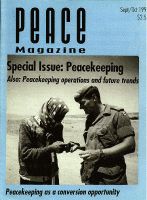
Peace Magazine Sep-Oct 1993, page 4. Some rights reserved.
Search for other articles by PMag staff here
In our last issue, we confided in our readers that we are having financial "challenges." We are delighted and grateful for your generous responses. Several people contributed $100, and we have regained confidence and courage. Many thanks!
This issue of Peace and the next one are devoted to a series of articles on peacekeeping and a variety of new, related operations: peacemaking, peace-building, peace-enforcement-all carried out by soldiers wearing blue U.N. helmets. New precedents are being set in the conduct ofinternational affairs. The U.N. in particular is undertaking a variety of new missions designed to protect the weak inside nation states, where a few years ago it would have stopped at the borders, respecting the sovereignty of those states. Today, now that the U.N. is no longer committed to stop where sovereignty starts, how and where are the appropriate exceptions to be identified?
Canada will, no doubt, continue to offer its military' support. On the other hand, many experienced Canadian officers and political theorists have serious misgivings about some of the present peacekeeping activities, which often seem to be turning into war-fighting intervention in support ofone side or the other.
You will find here several thoughtful articles about the constructive use of military forces from writers who basically support peacekeeping and/or who have served in such operations in the past. Col. Donald Ethell, Maj.-Gen. Leonard Johnson, and Maj. David Last, all speaking with military experience, advise commitment to negotiation. Professor Anatol Rapoport also expresses misgivings, from the perspective ofa peace researcher, and Rick McCutcheon, writing as a pacifist, is even critical of conventional peacekeeping. Mohammed Urdoh, a Somali, and Emilia Casella, both journalists, discuss the problems of U.N. operations in Somalia and Cambodia, respectively, recognizing the benefits of U.N. operations in those countries but also the ominous aspects.
As Lawrence Martin has noted elsewhere, "If those who are thought to be in the right are not to be allowed to lose... or if the principle is simply that no one must win, then intervention will clearly prolong rather than curtail agony. Intervention will produce stalemate rather than solutions-unless ... the interveners are prepared to defeat the stronger side. Even then, of course, the underlying tensions will probably remain, to erupt later if and when the international police forces retire." These are our concerns too. In the November-December issue we will explore ftirther the new demand for the U.N. to join internal wars to protect human rights, alleviate famine, and protect citizens from their own state or from enemy factions within their society.

Peace Magazine Sep-Oct 1993, page 4. Some rights reserved.
Search for other articles by PMag staff here